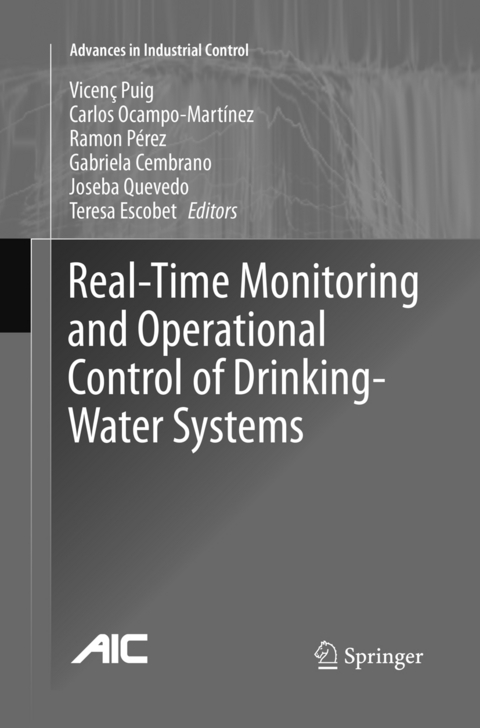
Real-time Monitoring and Operational Control of Drinking-Water Systems
Springer International Publishing (Verlag)
978-3-319-84483-1 (ISBN)
The methods and approaches presented are illustrated and have been applied using real-life pilot demonstrations based on the drinking-water network in Barcelona, Spain.
The proposed approaches and tools cover:
- decision-making support for real-time optimal control of water transport networks, explaining how stochastic model predictive control algorithms that take explicit account of uncertainties associated with energy prices and real demand allow the main flow and pressure actuators-pumping stations and pressure regulation valves- and intermediate storage tanks to beoperated to meet demand using the most sustainable types of source and with minimum electricity costs;- decision-making support for monitoring water balance and distribution network quality in real time, implementing fault detection and diagnosis techniques and using information from hundreds of flow, pressure, and water-quality sensors together with hydraulic and quality-parameter-evolution models to detect and locate leaks in the network, possible breaches in water quality, and failures in sensors and/or actuators;- consumer-demand prediction, based on smart metering techniques, producing detailed analyses and forecasts of consumption patterns, providing a customer communications service, and suggesting economic measures intended to promote more efficient use of water at the household level.
Researchers and engineers working with drinking-water networks will find this a vital support in overcoming the problems associated with increasedpopulation, environmental sensitivities and regulation, aging infrastructures, energy requirements, and limited water sources.
Prof. Vicenç Puig received his Ph.D. Degree in Control Engineering in 1999 and his Telecommunications Engineering Degree in 1993, both from the Technical University of Catalonia (UPC), Barcelona, Spain. He is currently a Professor and Chair of the Automatic Control Department and leader of the Advanced Control Systems (SAC) research group at UPC. He is also a researcher at the Institut de Robòtica i Informàtica Industrial, a Joint Research Center of the UPC and CSIC (Spanish Research Council). His main research interests are advanced control (using MPC and LPV approaches), diagnosis, prognosis and fault-tolerant control of dynamic systems. He has led many industrial projects concerning the application of previous techniques to large-scale systems (mainly, in the water domain). He is currently the vice-chair of IFAC Technical Committee on Fault Detection, Supervision and Safety of Technical Processes (SAFEPROCESS). He has been involved in many European projects and networks and has published over 400 papers in international conference proceedings and about 120 in scientific journals. He has also edited the Springer Book "Identification and Control: The Gap between Theory and Practice".
Introduction.- Real-Time Monitoring and Operational Control of Water Systems.- Part I: Modelling.- Modelling of Drinking Water Networks.- Parameter Estimation.- Nodal Demand Calibration.- Short-Term Demand Forecasting.- Part II: Monitoring.- Leak Monitoring.- Quality Monitoring.- Sensor Placement for Monitoring.- Data Validation and Reconstruction.- Fault Diagnosis.- Part III: Operational Control.- Model Predictive Control of Transport Networks.- Model Predictive Control of Distribution Networks.- Stochastic Model Predictive Control.- Fault-Tolerance and Health-Aware Strategies.- Partitioning the Network into Subsystems.- Decentralized Model Predictive Control.- Part IV: Future Trends.- Data-Driven Evolutionary Game-Based Control.- Coordination between Regional and Metropolitan Networks.- Big Data Analytics and Knowledge Discovery.
| Erscheint lt. Verlag | 29.7.2018 |
|---|---|
| Reihe/Serie | Advances in Industrial Control |
| Zusatzinfo | XXVI, 428 p. 169 illus., 121 illus. in color. |
| Verlagsort | Cham |
| Sprache | englisch |
| Maße | 155 x 235 mm |
| Gewicht | 932 g |
| Themenwelt | Informatik ► Grafik / Design ► Digitale Bildverarbeitung |
| Mathematik / Informatik ► Informatik ► Theorie / Studium | |
| Naturwissenschaften ► Geowissenschaften ► Hydrologie / Ozeanografie | |
| Technik ► Elektrotechnik / Energietechnik | |
| Technik ► Umwelttechnik / Biotechnologie | |
| Schlagworte | Drinking-water Networks • Fault Diagnosis • Fault-tolerant Control • Leak Detection and Localization • Model Predictive Control • Real-time Monitoring • Real-time Operational Control • Sensor-Data Validation and Reconstruction • Water Demand Forecasting • water industry and water technology |
| ISBN-10 | 3-319-84483-0 / 3319844830 |
| ISBN-13 | 978-3-319-84483-1 / 9783319844831 |
| Zustand | Neuware |
| Haben Sie eine Frage zum Produkt? |
aus dem Bereich


